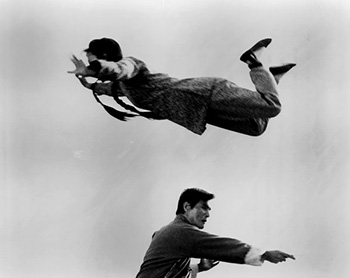(单词翻译:单击)

She was the first female kung fu star — name above title, said J. Hoberman, a longtime movie critic who now writes about video for The New York Times.
她是第一位女性功夫明星——想当初,她可是相当大牌,资深影评人、目前在为《纽约时报》(The New York Times)撰写DVD影评的J•霍伯曼(J. Hoberman)说。
He has fond memories of seeing Ms Mao’s movies on triple bills at Times Square grindhouse theaters in the 1970s.
他还保留着上世纪70年代的美好记忆:他猫在时代广场(Times Square)的磨坊戏院里,观看三场连放的由茅瑛主演的影片。
She basically had one act, which was going from an obedient character to a machine-like avenger, he added.
她基本上总是演这样的角色:从一个逆来顺受的人,变成冷酷无情的复仇者,他补充道。
A lot of people saw her films as feminist statements the same way as Pam Grier films.
很多人都觉得她的电影和帕姆•格利尔(Pam Grier)的电影一样,是女性主义者的宣言。
Ms Mao’s career coincided with the over-the-top, often impolitic exploitation era in film.
茅瑛的职业生涯恰好与电影史上那个毫无节制且常常不顾政治正确的剥削片时代重合。
The narrator for an American trailer of her 1972 film Hapkido declares: Watch out for the pigtail that whips you up and wipes you out.
在她1972年主演的电影《合气道》的美国版预告片中,旁白宣称:小心那条大辫子,它会让你心荡神摇,也会把你彻底摧毁…
… Lady Kung Fu: the unbreakable China Doll who gives you the licking of your life.
…功夫女王:坚不可摧的‘中国娃娃’给你好看。
She was born Mao Ching Ying in 1950 and grew up in Taiwan, the third of eight children, to a family of entertainers for the Peking Opera House.
茅瑛原名茅复静,1950年生人,在台湾长大,出身于京剧院的艺人家庭,在家中八个孩子中排行老三。
Like her siblings, she started training for the opera at a young age, taking voice lessons when she was 5.
和兄弟姐妹们一样,她很小的时候就学起了京戏,从5岁开始吊嗓子。
She also studied martial arts, specifically hapkido, rising to the level of black belt — a prowess that later distinguished her from other action stars, who merely choreographed their fight scenes.
她还学习了武术,尤其是合气道,练到了黑带水平——这方面的造诣后来让她从众多动作明星中脱颖而出。其他人在打斗场景中通常只是耍耍花架子。
In her 20s, she moved to Hong Kong, where a thriving film industry was based, but she was hardly romantic about it.
二十几岁的时候,她搬到了电影产业蓬勃发展的香港,但她对电影几乎没有任何浪漫幻想。
To be honest, the money was just better in movies, she said.
说实话,拍电影收入更高一些,她说。
I had to support my family.
我必须养家。
Most of the money I made I gave to them.
我把大部分收入都给了家里。
This is the Chinese tradition.
这是中国人的传统。
Leading female roles were rare in Hong Kong at the time.
想当年在香港,女性主角还很罕见。
Mr Meyers, the fan who met with Ms Mao at Lincoln Center, is the author of Films of Fury, a comprehensive history of the kung fu movie genre.
在林肯中心见到了茅瑛本人的影迷迈尔斯,是《狂怒电影》(Films of Fury)一书的作者,该书全面记录了功夫类电影的发展史。
Ms Mao, he said, was the first woman to star in her own action films without having to defer to a male star.
他说,茅瑛是第一位身为动作片主演且在片中不必屈居男影星之后的女性。
Men ran things, he explained.
男性曾掌管一切,他解释道。
Hong Kong had lots of machismo then.
当时的香港盛行大男子主义。
Women were considered ‘jade vases.’ They didn’t speak on screen.
女性被视为‘玉花瓶’。
They were considered decoration.
她们在电影里通常不出声,被当成摆设。
When asked about this epithet, Ms Mao snapped, I was never anybody’s ‘jade vase.’
当被问及对这个词的看法时,茅瑛厉声说道,我从来都不是任何人的‘玉花瓶’。
She shifted in her seat.
她在座位里挪动了一下身子。
Moments later, she dispatched her son to tend to a customer she noticed from the corner of her eye.
片刻过后,她打发儿子去招呼她用眼角余光瞥见的一位客人。


